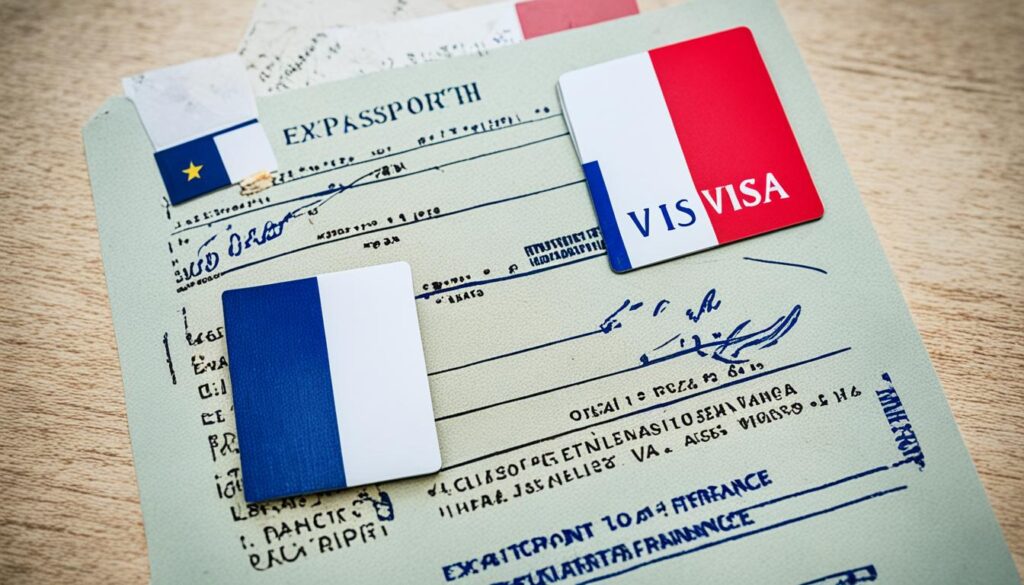France beckons to expatriates with its rich culture, delectable gastronomy, and diverse landscapes. Whether you’re enchanted by the vineyards of Burgundy or the chic allure of the French Riviera, this guide will help streamline your relocation process. With a total population of 66.9 million, France is home to 5.3 million expats, including 100,000 Americans and 5,500 Australians1. This vast expat community is a testament to France’s appeal.
Despite its luxurious reputation, living in France can be surprisingly affordable. Housing costs are, on average, 34% less than in the United States, while monthly rents are approximately 49.8% lower2. Additionally, the country offers excellent healthcare at a fraction of the cost found in many other nations. Access to world-class doctors typically costs around $9 per visit, with specialist consultations averaging $182.
Expats must carefully plan their move, starting with an understanding of visa requirements and residency options. A long-stay visa is necessary for non-EU residents intending to stay beyond 90 days3. For those planning a long-term commitment, this visa can eventually lead to permanent residency or citizenship.
Before making the move, consider taking a scouting trip and connecting with local expat communities. This on-the-ground research will provide valuable insights into daily life in France, making your transition smoother and more enjoyable. Let’s dive into the details to make your dream of relocating to France a reality.
Key Takeaways
- France is home to a rich culture, diverse landscapes, and an inviting expat community of over 5 million people1.
- Living in France is more affordable, with housing costs averaging 34% less and rents 49.8% lower than in the United States2.
- Non-EU residents, including Americans and Australians, need a long-stay visa for stays over 90 days3.
- Healthcare in France is cost-effective, with doctor visits around $9 and specialist consultations about $182.
- Connecting with local expats and taking a scouting trip are crucial steps for a smooth transition.
Understanding Visa and Residency Requirements
Navigating the visa and residency requirements is one of the essential steps in making your move to France smooth and successful. Whether you’re planning to stay short-term or settle down for good, understanding the different types of visas and the application processes is crucial.
Types of Visas Available
France offers a variety of visas depending on your specific needs and purpose of stay. For extended stays, the most common choice among expats is the Long Stay Visa, which allows you to reside in France for up to 12 months. To qualify for a long-term resident card in the EU, applicants must have resided in France for at least five years with sufficient means of subsistence4. For US citizens and citizens of Schengen Zone member states, no visa is required for visits up to three months5. Those looking to work or start a business can consider visas like the Talent Visa and the Profession Libérale visa.

Long-Stay Visa Application Process
The application process for a Long Stay Visa generally begins in your home country and is often facilitated by VFS Global. Financial requirements for the visa include proving means equivalent to the French minimum wage5. The Long Stay Visa does not allow one to work in France, requiring applicants to confirm in writing that they won’t seek employment5. Upon arrival, you can start the renewal process three months before its expiration5.
Renewal and Permanent Residency
Once in France, your initial visa allows for a 12-month stay, which can be renewed annually. After five years of residency, foreign nationals from specific countries, including Benin and Tunisia, can be eligible for a resident card under French rules4. After three years of residence, nationals from certain countries such as Burkina Faso can apply for a resident card under specific conditions4. The cost of a residence permit includes a tax of €200 to the OFII, a stamp duty of €25, and a long-stay visa cost of €994. For more details on the process of moving abroad to France, you can explore property financing options here.
Cost of Living in France
Moving to France can be both an exciting and financially manageable adventure. By understanding the cost of living in different regions, expats can budget more effectively and embrace the French lifestyle.
Housing Costs
Housing prices in France are generally affordable, with costs varying significantly across different cities and regions. For instance, the average price for a one-bedroom rental in Paris is €1392 ($1528), while in Strasbourg, it is €795 ($872), and in Pau, it is €579 ($635)6. Additionally, property taxes in France are one-tenth of what one could expect to pay in the United States6. The median purchase price for pre-existing homes in Toulon is €468,000 ($513,791), in the Marseille/Aix-en-Provence area it is €400,000 ($439,138), and in Montpellier, it’s €418,000 ($458,899)6. These factors combined make housing a significant, but manageable, part of the cost of living in France.
Everyday Expenses
Living in France involves various everyday expenses that expats should consider. The average cost of living for a single person is around 950€ per month7. Consumer prices in the US were 11% higher than in France in 20247. Grocery shopping also offers opportunities to save; a couple can expect to pay around $600 per month on groceries, and discount supermarkets like Lidl and Aldi provide 10-15% cost savings6. When it comes to eating out, a three-course gourmet lunch can cost around €28 ($31)6. Transport costs are reasonable, with a single transport ticket priced at $1.90 in France compared to $2.50 in the US7. Additionally, utilities in France cost around $190, a bit less compared to $205.61 in the US7.

Healthcare Costs
Healthcare is another area where the cost of living in France becomes advantageous for expats. The government-regulated system in France ensures significant savings, with visits to general practitioners and specialists costing a fraction of what one might pay in the US. This makes healthcare not only accessible but also affordable, contributing positively to the expat life in France. Understanding and utilizing the healthcare system effectively can lead to substantial financial comfort while living in France.
For more detailed information on the cost of living in France, you can visit HousingAnywhere7 and for tips on moving to France, visit Aparthotel6.
Finding Accommodation in France
One of the primary considerations when moving to France is deciding whether to rent or buy property. This choice is largely dictated by individual circumstances, such as length of stay and financial commitment. Both renting and buying have their benefits, and careful consideration is required to choose the right option.
Renting vs Buying Property
Renting property in France is particularly advantageous for newly arrived expats due to the flexibility it offers and the tenant protections provided by French laws. Approximately 40% of the French population rents their homes, with renting being more prevalent in urban areas like Paris and Montpellier, where the monthly cost of a one-bedroom apartment ranges from around €600 to over €1,0008. Rental markets in cities tend to be more robust compared to rural areas, where homeownership is more common9. Furthermore, renting in France often involves minimum lease periods—three years for unfurnished apartments and one year for furnished ones8.
Best Locations for Expats
France boasts several cities that are favored by expats for their vibrant communities, amenities, and cultural appeal. Paris remains a top choice despite its high cost of living, with a one-bedroom apartment costing over 1,000 EUR in the city center8. Other popular locales include Nice, where rental prices for a one-bedroom apartment are around €750, and Montpellier, which offers more affordable options at about €600-€650 per month9. For those seeking a more budget-friendly option, cities like Nantes present a middle ground with a mix of affordability and charm, where rents are about €500 in the city center8.

Short-Term vs Long-Term Rentals
Understanding the distinction between short-term and long-term rentals is crucial when finding accommodation in France. Short-term rentals, available for durations less than one year, are ideal for those in transitional phases or assessing different areas. Platforms like Airbnb and Spotahome are valuable resources for securing short-term accommodations, making the process hassle-free. In contrast, long-term rentals often come with longer lease periods—typically three years for unfurnished properties and one year for furnished properties98. These longer leases offer stability and are suited for expats intending to stay for extended periods.
Navigating the French rental market can initially seem challenging, but leveraging resources like hostels for temporary stays can provide cost-effective and convenient solutions. Hostels serve as an affordable gateway to exploring local neighborhoods before committing to a more permanent living arrangement9.
Navigating the French Healthcare System
Located at the heart of Europe, the French healthcare system is reputed for its exceptional quality and accessibility. Expats living in France can benefit from universal healthcare in France once they have been in the country for three months, given they plan to stay for at least another three months10. With over one doctor for every 1,000 citizens, the country ensures medical access for all residents10.

France spends over 11% of its GDP on healthcare, reflecting its commitment to providing top-notch medical services10. This high expenditure contributes to a life expectancy of 83 years, one of the highest globally10. The state’s healthcare system covers a broad spectrum of services, with patients generally paying minimal out-of-pocket costs, thanks to substantial government subsidies10. Dental consultations, cavities, and tooth extractions are also typically covered by the state10.
Expats healthcare in France is facilitated through a combination of public and private medical services. Public hospitals provide emergency care and specialized treatments, while private clinics often focus on elective procedures11. The average cost of health insurance for an individual is around 40 EUR (45 USD) per month10. Privately insured patients may receive coverage up to 100% for prescribed medications10, although private health insurance does not necessarily guarantee faster service.
In France, medical costs are typically reimbursed between 70% and 100%, depending on the treatment and healthcare provider11. The Carte Vitale, a health insurance card, facilitates direct reimbursement when accessing healthcare services11. Some services such as dental, optical, and certain private hospital care may not be fully reimbursed, making additional private health insurance advisable11. Prescription medications are also reimbursed differently, ranging from 15% to 100% based on their therapeutic value11.
The emergency hotline in France is 112 or 15 for medical emergencies11. Pharmacies play a crucial role in advising patients on medications and treatments, with many pharmacists fluent in English, aiding expats healthcare11. International health insurance plans and supplementary insurance from Mutuelle companies provide coverage for costs not reimbursed by French Social Security, such as dental and optical care12. In larger cities like Paris, international medical centers cater to expat clients, ensuring they receive care in their language12.
Overall, the French healthcare system stands as a testament to effective universal healthcare, integrated with private options to suit varied needs. With contributions from taxpayers ensuring access for all, regardless of income or status12, it provides a model of comprehensive and equitable healthcare for expats residing in France.
Opening a Bank Account in France
Setting up finances is crucial for expats settling in France. Opening a bank account in France involves various steps, which are necessary to manage your day-to-day finances effectively.
Documents Required
To open a bank account in France, you will typically need to provide several documents, including identification, proof of address, proof of income, and evidence of your employment or student status. Many French banks may also require a minimum deposit, especially for non-resident accounts13. It’s worth noting that bank branches usually operate from 09:00 to 17:00, Monday to Friday, and may be open for a half-day on Saturday13.
Choosing the Right Bank
When it comes to banking in France, expats have a broad selection of institutions to choose from. France boasts a highly developed banking system with over 400 banking institutions in operation14. Renowned banks such as BNP Paribas, Crédit Agricole, La Banque Postale, AXA Banque, and Deutsche Bank offer a comprehensive range of services, from current accounts to specialized savings and investment accounts14.
Expats should consider factors like accessibility, the availability of English-speaking support, and international banking services. Online and mobile banks like bunq, Hello Bank, N26, and Revolut provide instant 24/7 account access and seamless cross-border transactions, making them a popular choice among expatriates13. For a detailed guide on opening a bank account in France, you can refer to this comprehensive resource.

Using International Services like Wise
Managing international financial activities can often be challenging for expats. International banking services like Wise (formerly TransferWise) can significantly simplify cross-border transactions. Wise offers multi-currency accounts and low-fee international transfers, making it easier to handle finances while living abroad. This can be particularly advantageous for expats who need to manage payments and funds across different countries. By choosing the right services tailored to their needs, expatriates can ensure a smooth financial transition.
###
Learning French and Integrating into the Culture
Mastering the French language is fundamental for cultural integration in France. While it’s not strictly necessary to be fluent before moving, having a basic understanding can significantly improve daily interactions and overall experience. Interestingly, approximately 30% of expats find language classes or hiring private tutors beneficial for learning French15. Additionally, around 40% of expats improve their language skills through regular conversations with native French speakers or local events15.
Importance of Learning French
Learning French is vital as the language barrier is often a significant issue when moving to France, impacting people of different ages and backgrounds16. Understanding the language helps in navigating the complexities of French bureaucracy, an aspect where individuals moving from countries like the UK face increased administrative hurdles post-Brexit16. Furthermore, about 65% of expats believe that adapting to French work culture is essential for professional success15. Embracing the French love for joie de vivre, which focuses on pleasure and enjoying life, also aids in smoother cultural integration16.
Resources for Learning the Language
Various resources are available to help expats learn French effectively. For instance, there are hundreds of Alliance française centers worldwide that provide language classes and host cultural events17. Also, subscribing to French magazines can be an excellent way to immerse oneself in the language and culture17. Additionally, around 50% of expats emphasize seeking feedback from native speakers to refine their accents15. Virtual tours of French destinations and French cinema offer free ways to engage with the language and culture from the comfort of your home17.
Local Cultural Etiquette
Understanding local customs and etiquette is crucial for integrating into French society. French culture values adherence to rules over merely being polite or “nice,” which is a critical aspect of societal integration16. Approximately 60% of expats find adhering to French social etiquette essential for forming and maintaining relationships with locals15. Moreover, around 70% of expats rely on professional guidance to navigate French social manners, which can significantly aid in their cultural acclimation15. For those moving with children, enrolling them in holiday camps to interact with French peers can facilitate easier integration into the school system and local activities16.
By utilizing these resources and embracing the cultural nuances, learning French and cultural integration in France can be a more seamless and enriching experience for expats. For more detailed guidance on moving to France and obtaining a long-stay visa, consider reviewing this comprehensive guide here16.
How to move to France: Essential Preparations
Planning an international relocation to France requires meticulous attention to several key aspects. From sorting out visas to handling healthcare and finances, these preparations are indispensable.
Essential Moving Checklist
A comprehensive moving checklist for France can significantly streamline your process. Ensure your passport and visas are up-to-date, and start arranging healthcare coverage early on. It’s vital to budget for living expenses, which can vary based on the region in France. Administrative procedures for renting accommodation can be complex, so understanding the necessary paperwork is crucial. Before moving, expats should also arrange a sufficient supply of prescription medication and ensure their driver’s licenses and other identification documents are renewed and comply with local regulations1819.
Hiring an International Moving Company
When considering how to move to France, enlisting the help of an experienced international moving company can greatly facilitate the process. They offer expertise in transporting belongings and navigating customs procedures. It is beneficial to acquire storage facilities, which typically range between $60 and $150 per month in America’s suburbs, providing a cost-efficient solution during transitions19. Many moving companies also guide you through understanding and obtaining necessary insurances like health, liability, and housing insurance, which are mandatory in France18.
Pet Immigration Regulations
If you are a pet owner, familiarizing yourself with pet immigration regulations is essential for a smooth move. Ensure your furry companions meet the French pet entry requirements, which may include vaccinations and health certificates. By thoroughly preparing for these aspects, you can embark on your relocation journey with confidence and peace of mind. This level of preparation underscores the importance of a detailed moving checklist for France18.
For more insights on comprehensive vacation experiences provided by resorts, ranging from relaxation to adventure, visit this link.
Conclusion
Moving to France is an exciting adventure filled with numerous opportunities and experiences. As detailed in this guide, understanding visa and residency requirements is fundamental, with options such as the French Tech Visa and naturalization available for those meeting specific criteria20. Equally important is comprehending the cost of living in France, including housing, everyday expenses, and healthcare costs21.
Finding suitable accommodation and navigating the French healthcare system are critical steps for a smooth transition. Whether you decide to rent or buy property, each option provides unique advantages depending on your personal circumstances. Moreover, understanding the nuances of the healthcare system and securing healthcare coverage ensures peace of mind22.
Opening a bank account, learning the language, and integrating into French culture are indispensable for a fulfilling expat life in France. Organizations like Wise can facilitate international financial transactions while mastering French enhances daily interactions and deepens cultural integration. Finally, with proper preparation, including a thorough moving checklist, considering pet immigration regulations, and possibly hiring an international moving company, the move to France can be seamless and rewarding21.
This guide serves as a comprehensive roadmap to help expats navigate their transition into life in France successfully. Embracing the local culture, understanding the regulations, and planning meticulously will ensure a rich and enjoyable expat experience in La Belle France.
FAQ
What types of visas are available for relocating to France?
How do I apply for a Long-Stay Visa?
What are the steps to achieve permanent residency in France?
How expensive is living in France compared to the U.S.?
Is it better to rent or buy property in France?
Which locations in France are best for expats?
How does the French healthcare system work for expats?
What documents are required to open a bank account in France?
How can I choose the right bank in France?
Consider factors like accessibility, customer service, and international services. French banking institutions vary, and companies like Wise can help with international money management.
Is it important to learn French before moving?
While not essential, having a basic understanding of French can significantly enhance your experience and ease daily interactions. Numerous resources are available for learning the language, from online courses to local language schools.
What should be on my moving checklist for France?
Can I bring my pet to France?
Source Links
- https://wise.com/us/blog/moving-to-france-guide
- https://internationalliving.com/countries/france/move/
- https://www.themillennialabroad.com/2023/04/12/moving-to-france-from-the-us-the-ultimate-guide/
- https://www.welcometofrance.com/en/fiche/resident-card
- https://internationalliving.com/countries/france/visa/
- https://internationalliving.com/countries/france/cost-of-living-in-france/
- https://sirelo.com/moving-abroad/moving-to-france/
- https://www.internations.org/france-expats/guide/housing
- https://www.expatica.com/fr/housing/renting/rent-in-france-101131/
- https://www.internations.org/france-expats/guide/healthcare
- https://frenchconnectionshcb.com/a-comprehensive-guide-to-healthcare-for-expats-in-france/
- https://frenchconnectionshcb.com/healthcare-in-france-a-comprehensive-guide/
- https://www.expatica.com/fr/finance/banking/opening-a-bank-account-in-france-101158/
- https://preply.com/en/blog/opening-a-bank-account-in-france/
- https://frenchconnectionshcb.com/integrating-french-culture-tips-for-english-speaking-expats/
- https://www.connexionfrance.com/magazine/seven-tips-to-help-you-integrate-in-france/652565
- https://thefrancofile.net/how-to-incorporate-french-culture-into-your-life-from-anywhere/
- https://n26.com/en-eu/moving-to-france
- https://www.transitionsabroad.com/publications/magazine/0503/before_moving_to_europe.shtml
- https://getgoldenvisa.com/french-citizenship
- https://housinganywhere.com/France/work-culture-france
- https://eures.europa.eu/living-and-working/living-and-working-conditions/living-and-working-conditions-france_en

Comments